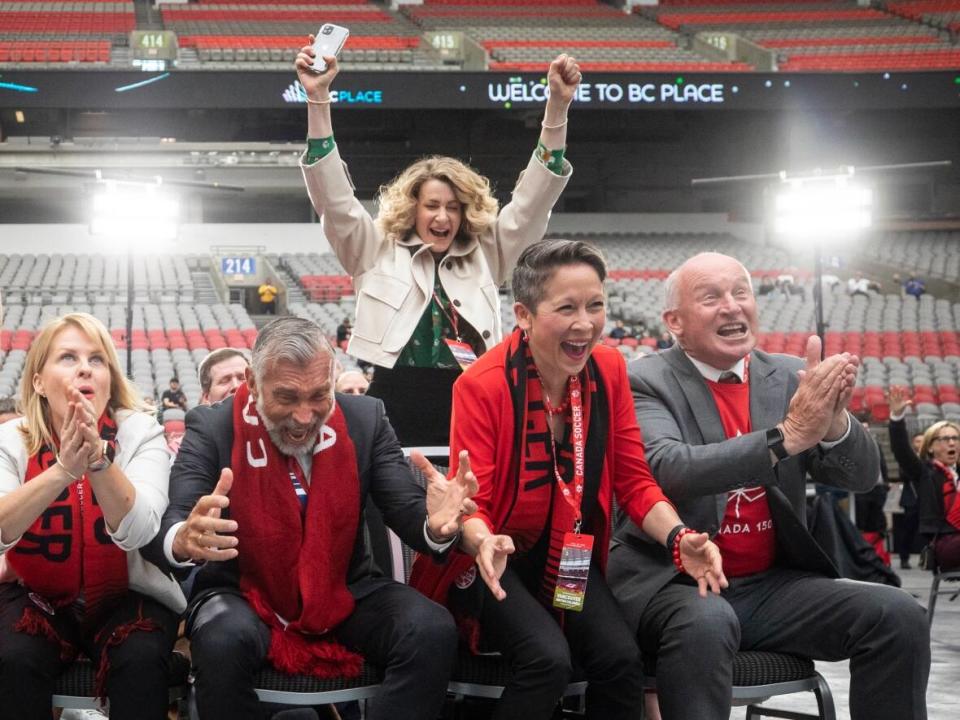So the 2026 World Cup is coming to Vancouver. Here's what we know

There were fist pumps and fireworks at B.C. Place Stadium when Vancouver was selected as one of 16 host cities for the 2026 FIFA men's World Cup last week.
But now that the cheers have subsided and the giddy politicians gone home, questions remain, not least of which is how many games will Vancouver get?
Canada has been allocated 10 in total, so with Toronto's BMO Field also making the cut, a 50/50 split would seem reasonable.
But B.C. Place is a larger stadium than BMO Field, with 15,000 more seats. More seats mean more ticket sales and more revenue, leading some to speculate Vancouver could ultimately be awarded six games to Toronto's four. The official announcement will be made at a future date.
Here are some of the other questions we've attempted to answer:
The price tag for hosting games in Vancouver is between $240 million and $260 million. Who pays?
According to the B.C. Ministry of Tourism, Arts, Culture and Sport, costs will be split between the three levels of government: municipal, provincial and federal. The federal government could contribute up to 35 per cent of the total price tag, according to its own policy on hosting international sport events.
Negotiations on a multi-party agreement will take place in the coming months.
What went into determining the cost estimate?
The estimate includes both operating and capital costs. Operating costs are things like B.C. Place staffing, running the required training sites and "Fan Fest," slated for the Pacific National Exhibition grounds. Also included are City of Vancouver costs for traffic management and security, including policing.
Capital costs include installing natural grass turf at B.C. Place Stadium and the training sites, plus any other facility upgrades and creation of the Fan Fest.
What are some of the unknowns that could factor into the final price tag?
The ministry said the estimate includes contingencies for details that remain unknown, such as the number of matches, transportation requirements, traffic management, ambulance and health services, and public safety planning. An update is planned for the fall.

What do we know about the Fan Fest at the PNE?
This will be a live viewing site showing every single game of the 80 game tournament, which runs from June 8 to July 3, 2026, with an expanded format of 48 teams. For the group stage, that means three games per day on the big screen.
Michelle Collens, Vancouver Sport Hosting senior manager, said the PNE's size and scope make it a good fit for the Fan Fest. She hopes other communities will jump on the World Cup bandwagon and also host public viewing sites.
"I think one of the best things that we did during the 2010 [Olympic] Games is that we had a number of live site celebrations throughout the province of British Columbia," said Collens. "The more that we can all feel like we're a part of this, the more energy it will bring and the more lives we'll impact."
What 2026 World Cup-related events could come to Vancouver?
Collens said as the next part of the bid process, Vancouver will be running to host the 2026 World Cup draw, scheduled for December 2025.
"As a host city we would love the opportunity to showcase Vancouver as a destination for that draw [and] host it at the Vancouver Convention Centre with the backdrop of the North Shore mountains," she said. "We're ready for that."
Additionally, FIFA will be looking to place a 2026 World Cup sponsorship summit and the international broadcast centre for the tournament, and Canada Soccer has committed to staging at least five international matches in Vancouver in the lead-up to the tournament.
Why does the artificial turf at B.C. Place need to be replaced with natural grass?
Natural grass, considered less likely to cause injury, is a FIFA requirement for World Cup matches and training sites.
According to Collens, the world governing body for soccer has turf specialists who will work across all 16 venues to ensure a level of consistency in the fields. The cost of bringing in natural grass has not yet been determined.
Where will the training sites be located?
FIFA has a 25-kilometre distance limit for where training sites can be situated in relation to the players' hotels, which will be in downtown Vancouver.
Collens said at least one of the training sites will be a Vancouver Park Board facility. UBC is also a strong candidate. At least two training sites will be needed, possibly three.
Why do political leaders think hosting 2026 World Cup games is a good idea?
One answer: tourism.
According to the province, hosting five or six World Cup games could generate over $1 billion for B.C.'s tourism sector for the five years surrounding the tournament, and could draw as many as 269,000 visitors, with almost half from outside of Canada or the U.S.

 Yahoo Sports
Yahoo Sports 